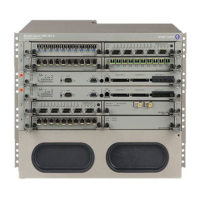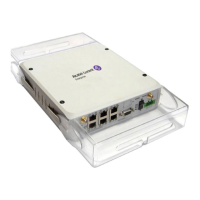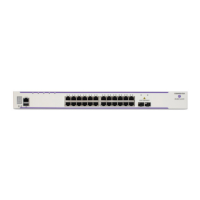Installing and Removing SFPs
108 7705 SAR-M Chassis Installation Guide
Installing and Removing SFPs
The 7705 SAR-M has four ports that support small form-factor pluggable (SFP) devices for
Ethernet connections.
Warnings and Notes
Danger:
• Invisible laser radiation can be emitted from the aperture of Ethernet ports 1 through 4
or from an installed SFP module when no cable is connected. Avoid exposure and do
not stare into open apertures.
• Always assume that fiber-optic cables are connected to a light source.
• Only trained and qualified personnel should install or replace this equipment.
Warning:
• Electrostatic discharge (ESD) damage can occur if electronic components are
mishandled. Always wear an ESD-preventive wrist or ankle strap and always connect
an ESD strap to a nearby ground point that is connected to the site grounding point
when working on the 7705 SAR-M. Typical ground points include the ground connection
point on the 7705 SAR-M left-hand side mounting bracket (but only after the
7705 SAR-M is installed and the chassis ground wire has been connected), the
grounding stud on the 7705 SAR-M right-hand side mounting bracket, or a properly
grounded rack or work bench.
• Always place components on an anti-static surface.
• Use only approved small form-factor pluggable (SFP) fiber-optic devices in a
7705 SAR-M.
• Before using the optics on the 7705 SAR-M, verify that the optical path is in compliance
with the parameters of the optical components. In particular, pay close attention to any
minimum attenuation requirements for the optics. If minimum attenuation requirements
are not met, the optical receiver components may be permanently damaged. Contact
the appropriate technical support center for assistance and further information about
your Alcatel-Lucent products.
• Ensure that the ports on an SFP are protected by an SFP protective plug when you
install or remove an optical SFP. Only remove the plug when you are ready to install an
optical cable.
• Ensure that the connector on the fiber cable is protected by a dust cover until you are
ready to attach the cable to an SFP.
• Always replace the dust cover on the connector of a fiber cable when the cable is
disconnected from an SFP.
• Avoid bending fiber-optic cable beyond its minimum bend radius. Do not exceed the
recommended 1.2 in. (3.0 cm) for fiber-optic cables.
